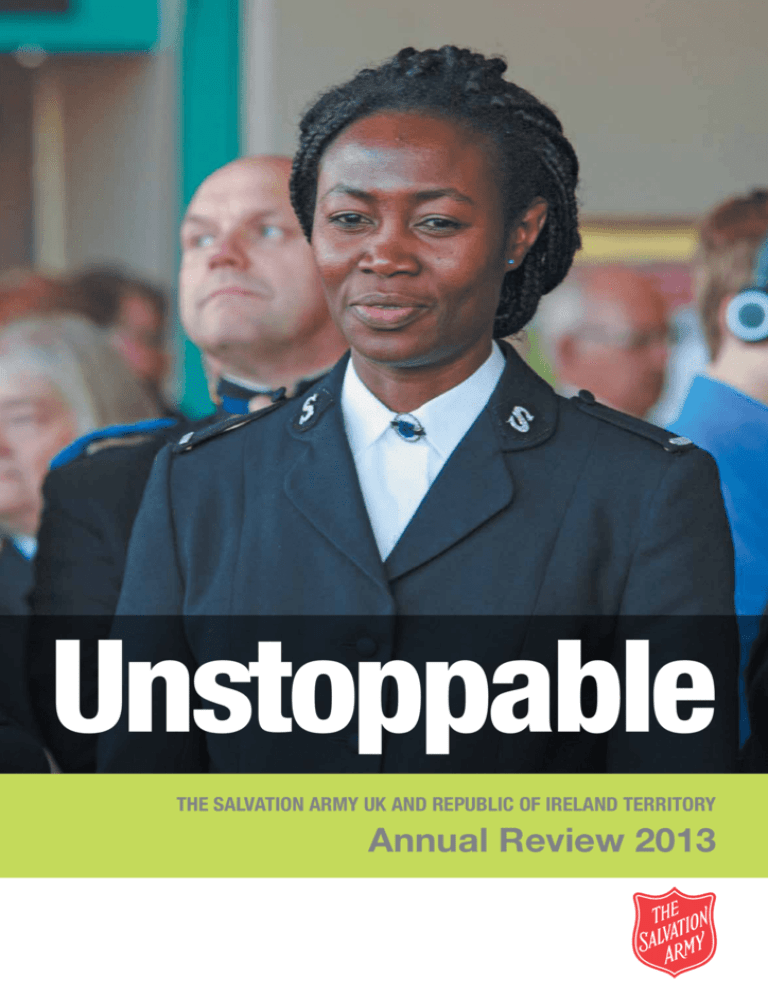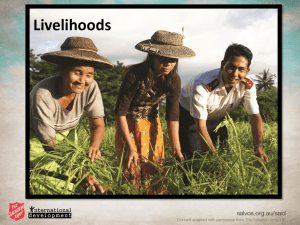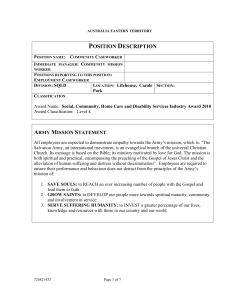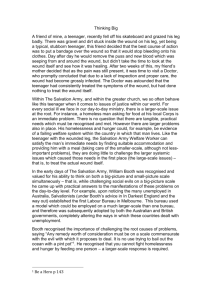Annual Review 2013 - The Salvation Army
advertisement

Unstoppable The salvation army uk and republic of ireland territory Annual Review 2013 The Salvation Army is a worldwide evangelical Christian church. Our THE UNSTOPPABLE WORK WE DO…IN NUMBERS nOver message is based on the Bible; our motivation is the love of God as revealed in the year, The Salvation Army supported over 2,500 people on the Work Programme to help people get back into employment. nThe Salvation Army’s Family Tracing Unit helps reunite around 1,780 families a year. nWe served around 3 million nourishing meals throughout the year at Salvation Army community and residential centres to older people, homeless people and young families. Jesus Christ. Inspired by our nLast faith, we engage in a nWe year The Salvation Army’s Emergency Response Unit attended 163 emergencies across the country. have 62 residential Lifehouses across the UK for homeless people, providing 3,200 beds a night. programme of practical action to serve the community, to help those nThe Salvation Army organises on average 414 Parent and Toddler clubs per week to enable children to play in safe environments and where parents meet with Salvation Army Officers and other parents for support, with an average weekly attendance of 14,742. nThe Salvation Army Emergency Services Unit handed out over 500,000 bottles of water to spectators travelling to the Olympic and Paralympic Games. who are suffering and in need, and to fight for CONTENTS social justice. 2 Page three A word of welcome from our UK Leader Page four We never stop helping people in need Page six We never stop building stronger communities Page eight We never stop proclaiming our faith Page ten We never stop fighting for justice Page eleven How we’ve put your money to work ‘For The Salvation Army there’s never a moment’s rest. We wouldn’t want it any other way.’ A WORD OF WELCOME Added to this is our continuing work as part of the evangelical Christian church, spreading the message of the Gospel, encouraging people to take that message into their own lives, and working with other Christian denominations to put our shared beliefs into action. FROM OUR UK LEADER When The Salvation Army’s founder William Booth was told by his son about all the homeless people sleeping on the banks of the Thames, his response was simple: ‘Go and do something.’ That was in the middle of the nineteenth century. But today The Salvation Army’s philosophy is exactly the same. We see the problems our society faces – family breakdown, poverty, homelessness, hunger, drug and alcohol addiction, domestic violence, child abuse and much more besides. We see men, women and children suffering greatly. More than anything we want to do something practical to bind and heal their wounds. Inspired by our Christian faith, we work tirelessly in communities across the UK and right round the world to help people in terrible difficulties to overcome their problems and get back on their feet. And we do it regardless of their ethnicity, faith or background. In this Annual Review you will see something of the work we have done over the past eventful year. And, whether you are part of The Salvation Army, or in a partner organisation, or simply interested in what we do, let me assure you of one thing. Our work will go on, determined, undaunted and unstoppable, for as long as people need us. Commissioner Clive Adams Leader of The Salvation Army in the UK and the Republic of Ireland ONE MAN’S STORY Tim had a truly terrible childhood. He was beaten and sexually abused from a very early age. He was never happy and, when he grew into a teenager, he turned to alcohol and cannabis to deaden his pain. Knowing he needed help to overcome his addictions, Tim turned to The Salvation Army. One of our specialist addiction centres did its best for Tim, but after leaving us, he relapsed into his old ways. Trapped by his addictions, he became suicidal, repeatedly attempting to take his own life with overdoses and even trying to hang himself. ‘No matter how bad things were, you never gave up on me’ Tim felt ashamed when eventually he returned to our Salvation Army centre to ask for help again – but he was astonished to find that our staff, instead of judging him, warmly welcomed him back. And this time their friendship and constant support helped him find the strength to break free from his addictions. Recently Tim completed our six-month programme of detox and rehabilitation – and as he says himself: ‘I’m a new man’. He can’t believe The Salvation Army devoted so much time and patience to helping him. ‘No matter how bad things were, you never gave up on me,’ he says. Today he is ‘clean’ of drink and drugs and is rebuilding his life as a volunteer at a day centre for children with learning disabilities. It’s the first stage on the road to a healthy, independent and fulfilling way of life. For more information, go to www.salvationarmy.org.uk/uki/addiction 3 WE NEVER STOP When people are homeless, hungry, lonely, abused, addicted to alcohol or drugs, or suffering in any other way, they always have a friend they can turn to – The Salvation Army. We are at work every day in hundreds of communities offering friendship, comfort and practical solutions to people in need. Homelessness ‘You gave me a second chance when I needed it most’ Tony worked in the building industry until serious mental health problems nearly wrecked his life. At one time, he was living rough on the moors because he couldn’t stand being with other people. He was still very distressed when one of our Salvation Army Lifehouses took him in. Lifehouses, of which there are 62 across the UK, are The Salvation Army’s residential centres for homeless people. But they are so much more than that, because they offer people not only food and shelter but a whole new start in life. And that’s exactly what Tony needed. It took a lot of time and effort by our Salvation Army officers and staff to persuade him to accept our help. But we made friends with him. We listened as he told us about his life and his problems. We helped him to feel valued and built up his self-confidence. And gradually his whole outlook was transformed. He is calmer now, and much more accepting of other people. As Tony prepares to leave us, we’ve been teaching him the skills he will need to live on his own and he is now working alongside other homeless people in the centre’s workshop – something that would once have seemed impossible. They repair and rebuild bicycles which are then sold to people in the local community. Our unstinting support and belief in Tony has changed his whole life. He says: ‘You gave me a second chance when I needed it most. I don’t think anyone could have helped me the way The Salvation Army has.’ Highlights of the Year For more information, go to www.salvationarmy.org.uk/uki/homeless 4 n For one week in November, The Salvation Army teamed up with ITV’s Daybreak programme and Co-operative food stores to launch the You CAN Help campaign. The idea was for people to donate cans of food to collection points at the Co-op, so that The Salvation Army could make up food parcels to help struggling families put food on their table at Christmas. Besides collecting thousands of cans for hungry people, the campaign also put the work of The Salvation Army in the spotlight, when Daybreak went live at some of our centres, meeting officers, staff and volunteers. n The past year saw the official openings of two new Salvation Army Lifehouses. Our new Northlands Lifehouse in Cardiff and our Booth House Lifehouse in Grimsby will offer accommodation, rehabilitation and training opportunities for homeless people to help them back on their feet. Booth House offers its services to men and women over the age of 25, while Northlands is specifically targeted at young people aged between 16 and 25. n The Salvation Army’s ground-breaking Eva Burrows 1st Stop Project, based in Cambuslang in South Lanarkshire, received a Royal seal of approval. There was great excitement at the project, and in the local community, when HRH The Princess Royal visited to see for herself how the project is changing people’s lives. The service offers accommodation and support to homeless people with the aim of resettling them and providing a stepping stone back to independence. n Visiting a family member in prison can be a distressing experience, which is why The Salvation Army runs a Visitors’ Centre at Edinburgh Prison, the only purpose-built facility of its kind in Scotland. The aim is to help visitors relax and give them the support and information they need. Now we have expanded the service by organising more activities for children, including a Children’s Corner where they can play, and family events such as a Christmas party. We believe that by helping prisoners and their families spend time together, we can help them rebuild their relationships once the time in prison is over. helping people in need Hunger Human trafficking Hungry families turn Enslaved and degraded, to The Salvation Army but now Miriam is free It’s traditional for The Salvation Army to distribute food parcels to families in need at Christmas time. But recently, many families have been facing hardship at other times of year. We take our promise to ‘feed the hungry’ very seriously indeed – and that’s why, in many parts of the UK, we have been distributing more and more emergency food parcels to give short-term assistance to families in need. The Salvation Army is in the forefront of combating human trafficking, in the UK and worldwide. East Staffordshire is one of the areas where we have been particularly busy. Vic Wileman, from the local Salvation Army, says: ‘We often come across situations where the parents are going without to ensure the limited food they have goes to the children.’ The food parcels are given to specific families who are identified as having an immediate need. It is not intended as a long-term solution, but can provide much-needed relief while we help them get their lives and their finances on an even keel. The parcels include staple items such as tins of beans and soup, bread, milk, pasta and cooked meat. The East Staffordshire food project, like similar Salvation Army projects in other parts of the UK, is generously supported by the public. There is a food bank at the local supermarket where local people can donate an item of food as they do their shopping. We also use our own funds to buy extra food so that we can meet the growing demand. For more information, go to www.salvationarmy.org.uk/uki/heretohelp Since the UK Government gave us the responsibility for managing support for adult victims of human trafficking in England and Wales in July 2011, we have supported 782 victims: 471 female and 311 male. We take them from their point of rescue to safe houses where they can recover from their ordeal. We also give them access to legal advice, health care, counselling and educational opportunities. Commissioner Silvia Cox recently visited a safe house specialising in supporting women who are victims of human trafficking to hear the moving stories of the people we support there. Miriam, from Rwanda, was trapped in a marriage with a violent man, until a ‘friend’ helped her escape to the UK. But sadly the ‘friend’ was a human trafficker, and for three years she was held captive in the UK and forced to work as a prostitute. Those years were truly terrible. She was never allowed to leave the house on her own. But finally someone left the door open and she fled. The turning point came when a stranger saw her huddled in a car park and put her in contact with The Salvation Army. We found her a place at one of our safe houses, where we gave her the medical care and emotional support she badly needed. Miriam is now in a home of her own and studying for a social care qualification so that she can get a job. She is still deeply traumatised, but The Salvation Army’s friendship has given her the strength to carry on. As she says: ‘You learn to live with what happened, but you never forget.’ For more information, go to www.salvationarmy.org.uk/uki/trafficking 5 WE NEVER STOP In cities, towns and villages right across the UK, The Salvation Army is part of the glue that holds communities together. We want to help build a society where no one, whatever their age or background, is excluded or marginalised. And the services we organise are aimed at making that ideal a practical reality. Older people Happy memories for people with dementia It’s well known that people with dementia are helped greatly by having their memories stimulated. It helps them communicate and gives them a sense of belonging. That’s why The Salvation Army’s Eva Burrows Day Centre in Glasgow came up with a novel idea to stir particularly fond memories. They held a party to celebrate the Queen’s Diamond Jubilee in their reminiscence room. The reminiscence room is full of objects designed to stimulate people’s mind and senses and remind them of their past. For example, it has a smell box with different oils or smells from the past such as boot polish. An old radio is on display along with pictures, ornaments, tin cans and washing boards. On Friday 8 June 2012, around 20 people aged between 62 and 99 years old gathered there to watch films of the Queen’s Coronation and the jubilee celebrations. There was also a dinner, tea dance and sing-along to get everyone in the mood. The Diamond Jubilee event is just one example of how The Salvation Army cares for older people – going the extra mile to give them the best possible quality of life. Sandra Sneddon, centre manager at Eva Burrows, said: ‘Reminiscing can be highly beneficial to older people with dementia. Some people can feel agitated trying to remember certain details and the room is very calming for them. They can relate to the objects and pictures, which triggers conversations about their past.’ Highlights of the Year For more information, go to www.salvationarmy.org.uk/uki/OlderPeople 6 n Over the past year, The Salvation Army’s Emergency Response Teams attended 163 different emergencies such as fires, floods and transport accidents. Thanks to the dedication of our trained volunteers, we were able to provide practical and emotional support, both to members of the emergency services and to members of the public caught up in terrible situations. Several times we were asked to organise rest centres for people evacuated from their homes. During the Olympics and Paralympics, we also distributed around 500,000 bottles of water to spectators travelling to the Olympic sites. n Over the past two years around 150 young people have been through Music Rocks. This initiative reaches out, through the medium of music, to socially excluded young people, including young carers and those who are not in education, employment or training. Over six weeks, young people between 11 and 25 are offered music tuition and personal mentoring. Since it began Music Rocks has succeeded in inspiring young people to achieve something to be proud of and encouraging them to get back into education or employment, and continues to show The Salvation Army’s commitment to the importance of music. n The Salvation Army’s Older People’s Services have received a Commendation Status Award in the Gold Standards Framework Care Home Accreditation Assessment. This prestigious award is the result of a nationally-recognised training programme that enables care homes and their staff to provide an excellent quality of care for their residents. n The past year has been a busy and successful time for our Family Tracing Service. Of around 2,000 cases that we accepted, we were successful in 89 per cent of them, working with Salvation Army colleagues around the world. The joy this has brought to hundreds of families is truly beyond words. Among our successes, we united a 71-year-old man with two brothers he had never met, after a lifetime of searching for his family. We united a 42-year-old man with the mother he was taken away from at the age of seven. And we united a woman with the sister she had lost contact with 31 years before. building stronger communities Young people Opportunities for life ‘You’ve given me a belief How we brought Chris back in myself’ from the brink of despair In parts of London and other major cities, gang culture is rife. Young people, especially if they are homeless and have few opportunities in life, are drawn into a life of crime and find it very hard to escape. That’s why The Salvation Army is fighting back against gang culture by giving homeless young people the security and the opportunities that they need. Being unemployed was difficult for Chris, but at least he had his family to make his life bearable. Then came a devastating tragedy, when his 22-month-old daughter suddenly died. Our Springfield Lodge Lifehouse in Camberwell, which was officially reopened in October 2012, is a residential, educational and training centre for homeless young people. Many of the people who come here are former gang members and offenders. Yet thanks to the opportunities that are available here and the encouragement they receive from our dedicated and inspiring staff, many are turning their lives around in a quite amazing way. Springfield not only gives them a safe refuge from local gangs, but teaches them new skills that can help them find a job, such as DIY, cooking, computer skills and horticulture. Often having a useful skill transforms a young person’s whole attitude. Lives that could so easily have been one long story of crime and imprisonment can take a far more positive direction. One young man told us: ‘When I first came here I had been in prison for six months. I now have a qualification in carpentry. I still have a lot of issues to deal with – but having somewhere safe to come home to gives me a belief in myself that I never had before.’ For more information, go to www.salvationarmy.org.uk/lcn/SpringfieldLodge For months Chris felt as if he couldn’t go on. But finally he realised that working could help him cope with his grief. He asked the local job centre for help, and they referred him to The Salvation Army’s Employment Plus service. Employment Plus gives unemployed people all the support they need to get back into work – including coaching, advice on training opportunities, internet access, help with writing applications. But what made the biggest difference to Chris was the sensitive way we treated him. We understood that getting his life back together after his bereavement would be difficult. So the first few meetings he had with his Life Coach were at a local coffee shop. In this relaxed setting, we talked with Chris about the opportunities that might be available to him. As a result, he has enrolled at a local college to gain a qualification in plumbing. Chris is now making use of all our facilities to find a job. He is also socialising with other job-seekers – something he thought he would never have the confidence to do again. Things are still hard for Chris, but The Salvation Army has helped him get through a terrible time. As he told us, ‘You helped me to see that I still have a future.’ For more information, go to workforall.salvationarmy.org.uk/ 7 WE NEVER STOP As a worldwide evangelical Christian church, our mission above all is to proclaim the gospel message and bring people to the knowledge of Jesus Christ. We do this, not just through worship, but by taking our faith out into the community and putting it at the centre of people’s lives. Campaigning for justice Salvationists answer the Founder’s call One hundred years after William Booth, Founder of The Salvation Army, made his final public appearance in London’s Royal Albert Hall, the venue hosted another great gathering of Salvationists in June 2012 at the I’ll Fight Congress. The event, which included moments of celebration, worship and prayer, was around the theme of fighting for social justice. In her address as international leader of The Salvation Army, General Linda Bond quoted from the Founder’s ‘I’ll Fight’ speech, asking: ‘Where did the Founder get this fighting spirit? Where did he get this heart for souls?’ She gave her own answer: ‘He got it from Jesus.’ General Bond talked about what is happening in the worldwide Army, referring to help for trafficked people, those suffering from disease, poverty and persecution, and how the work continues to grow. She declared: ‘The Salvation Army belongs in the dark places.’ During the final meeting of the congress, General Bond returned to the theme of social justice. ‘There is something wrong with society when the rich are getting richer and richer, and the poor are getting poorer and poorer,’ she said. Highlights of the Year She recited sections of the Founder’s ‘I’ll Fight!’ speech, placing it in a modern setting and demonstrating its relevance to our society 100 years on. Then, addressing the thousands present and those around the world watching online, she challenged them to carry on the fight: ‘Wherever you are … say: “Yes, Lord, I will fight. I will fight to the very end!”’ 8 n We continue to engage with politicians and community leaders to influence society in a Christian direction. In this spirit, our church centre in Great Yarmouth was the venue for Communities Secretary Eric Pickles and Baroness Helen Newlove to launch a new initiative to reduce under-age drinking and street drinking. The Community Alcohol Partnership will be working with a host of agencies in the Great Yarmouth area – including police, the local council, schools and supermarkets – to encourage responsible drinking and help people understand the safe limits on alcohol consumption. n The Salvation Army’s commitment to grow faith in young people, through the Essential Gap Year Programme, continues to deliver remarkable results. The programme is for anyone aged 18-24 who wants to get stuck into a Salvation Army placement – working with children and young people, visiting older people, serving people in need, leading assemblies, preaching and doing much more besides. Nick Oliver from Basildon started on the programme in September 2012 and was given a placement in Openshaw, Manchester. He says now: ‘I’m a different man from the one I was in September. I hoped to grow in my knowledge of God and in my faith but also to gain confidence and become a leader. I feel like I am achieving these things.’ n It’s more than a year now since we started our Chaplaincy Unit, which recognises chaplaincy as a distinct discipline within The Salvation Army, with its own role of caring for those in need. Since then we have seen the chaplains’ training programme produce its first graduates. Our goal is to put a chaplain in every Salvation Army social centre. n September 2012 saw the re-launch of our Annual Appeal, under the new name of The Big Collection. Volunteers and church members carried out street collections, door-to-door collections and other fundraising events, raising a total of £2.2 million for our work to help people in need. It also provided a golden opportunity for our collectors to tell members of the public what The Salvation Army is and does and the values we stand for. proclaiming our faith Belief in action Faith in the community Young people raise their Making room for prayer in voices against exploitation our lives When it comes to fighting injustice, there’s nothing more powerful than the idealism and energy of young people. So it’s not surprising that The Salvation Army’s youth organisation ALOVE is taking a lead in campaigning against one of the biggest social evils of our time – human trafficking. Prayer is at the centre of all Christian worship. And in The Salvation Army, we don’t just pray for people, we take prayer to the people – going out into the community and offering everyone who wants to pray the opportunity to do so, even in the midst of their busy lives. Human trafficking involves the use of force to recruit and transport people and to force them to work against their will. It’s a modern form of slavery that is against everything Christians believe. ‘Please help me.’ ‘Pray for my daughter.’ ‘Help me with my exams.’ These are just a few of the messages that adorn the walls of Sanctuary 21 in Durham, a prayer centre run by The Salvation Army which is host to thousands of Christians every week. That’s why ALOVE has decided to give young people a voice in opposing it. ALOVE’s Cut It Out campaign aims to raise awareness of the issue and encourage people to take action against it. Sanctuary 21 has been open for four years. Its purpose is simple – to provide a quiet space for meditation in the middle of a bustling city. The campaign particularly focuses on the trafficking of people – mainly girls and young women – for the sex trade. Cut It Out is fighting back against this form of exploitation by pressing for government action to stop the sex industry advertising in the press and also end advertising of sexual services online. The prayer centre is the brainchild of two imaginative Salvation Army officers, Captains Dawn and Gary Lacey. Since it was opened in an old Salvation Army building, it has gradually grown and developed, so that it is now home to worship on Sundays, a café on the top floor, and two rooms filled to the rafters with prayers written across the walls. New campaign materials, including a software app, have been produced to show young people how they can get involved. The campaign has been designed so that young people can join in at a level that is appropriate to their age. ‘We really do get all sorts of people in need in here – students, tourists and Christians of all denominations,’ says Gary. ‘And we get people in desperate need, who come to us for help.’ Hannah Kingston, one of the organisers of the campaign, says: ‘We want young people to realise that they have a voice that can be used for good and that they can make a difference in their world.’ Ultimately, though, the most moving aspect of Sanctuary 21 is the messages addressed to God. Each six-inch prayer card is a testimony to a life. ‘These walls are not just their prayers, but their stories,’ says Gary. For more information, go to sanctuary21.co.uk For more information, go to alove.salvationarmy.org.uk/ 9 WE NEVER STOP fighting for justice The Salvation Army is a worldwide church, active in 126 countries. Our commitment to justice and to people in need knows no boundaries of nationality, race or creed – and some of our most innovative and effective work is done in the poorest countries of the world. Raising living standards Fighting hunger How a simple sand dam Seeds of hope for hungry changeD Kakwesi’s life people Water is scarce in Kenya. All over the country, women like Kakwesi dig down into the river beds in search of water beneath the sand. Bakidi health centre is a Salvation Army run facility in one of the poorest neighbourhoods of Kinshasa, in the Democratic Republic of Congo. Our team there has been working with a group of young agricultural experts to try to reduce malnutrition, which is rife in the area. Until recently collecting water was 68-year-old Kakwesi’s biggest task. Four times a day she walked two kilometers to the river bed to collect water, and then made the same journey back to her home, this time uphill with the sun beating down on her back. But now things have changed in the village of Tawa where she lives. The Salvation Army and the community together have built a sand dam across the bed of the river. This wall of concrete uses the natural flow of the river during the rainy seasons to build up the level of sand and create a natural reservoir, which also acts as a filter to remove impurities. Highlights of the Year Thanks to this project, people in Tawa now have water during the dry months – and there are other important benefits. Kakwesi told us: ‘The dam will bring the water closer and we may be able to pump it. My hope is that, by irrigating our land, I and my children can grow more food.’ 10 Together we came up with a proposal to distribute moringa seedlings and train local people in how to grow the trees and use the seeds and leaves for nourishment. Moringa is considered one of the world’s ‘miracle trees’, as almost every part can be used for food or has some other beneficial property. The leaves are dried, crushed, and then added to food or water since they contain all essential amino acids and are rich in protein, Vitamin A, Vitamin B, Vitamin C, and minerals. The seeds, dried and crushed, can be used to purify water. The project will plant a demonstration plot of 200 trees at the health centre and will distribute 10,000 trees to mothers in an effort to halve the number of malnourished children and mothers who come to the centre. n The Salvation Army has been working to combat child trafficking in Malawi since 2006. Our centre in the town of Mchinji cares for up to 120 vulnerable children a year – and in the past year we have made remarkable progress towards stopping trafficking in the Mchinji district. We’ve achieved this through a range of activities, including raising awareness of children’s rights and teaching practical skills to young people so that they can earn a living. We are also supporting pig and goat banks so that families can raise their living standards and keep their children out of the hands of traffickers. n So often the enthusiasm and commitment of The Salvation Army’s supporters is truly breathtaking. One amazing example is 70-year-old Andy Peddle, who has devoted 18 months to a charity walk across the UK and Ireland with the aim of raising £100,000 for our work to help homeless people and victims of human trafficking. His epic journey started in the Shetland Islands in May 2012 and finishing in October 2013 in London, having clocked up over 7,900 miles and visited 949 Salvation Army centres. To find out more about our efforts to combat poverty and injustice all over the world, visit www.salvationarmy.org.uk/id. How we’ve put your money to work Income The Salvation Army operates in the United Kingdom through two main trusts, The Salvation Army Trust (Central Funds) and The Salvation Army Social Work Trust (Social Work Funds), which had combined income, excluding inter fund transfers, of £274m for the year ended 31 March 2013 (2012: £261m). Income from social work activities decreased marginally from £86.6m to £85.4m. This comprises income from care homes for older people, lifehouses, family and children centres, substance misuse centres, outreach work, defence services centres and the turnover of The Salvation Army Housing Association (SAHA), a wholly controlled subsidiary of Social Work Funds. Legacy income, always variable by nature, decreased by 9% to £39m. Despite the difficult economic climate, donations from the public increased by 6% to £41m but grants decreased by 43% to £5m. Donations from members decreased marginally to £19.4m. Trading income increased by 41.6% to £65.5m as a result of the acquisition by The Salvation Army Trading Company (SATCOL) of Kettering Textiles Limited on 2 April 2012. The main activities of SATCOL, a wholly owned subsidiary of Central Funds, are the collection and sale of second hand clothing donated by the public. Investment income decreased by 6% to £7.5m. There was an increase in gains on disposal of properties and other income to £12m: these sources of income fluctuate year on year Expenditure Charitable activities: 20132012 £m£m Social & defence services Church & evangelism Community programmes International programmes Training programmes Youth programmes 103.5 47.7 47.6 5.6 5.1 2.4 103.7 45.8 45.9 6.0 11.6 2.0 Total charitable activities 211.9 215.0 Total expenditure 47.0 27.4 10.1 8.4 1.21.1 270.2 Statement by the Trustee The financial information shown on this page is a summary of information relating to the Statement of Financial Activities and Reserves of The Salvation Army Trust and The Salvation Army Social Work Trust. The full financial statements of both Trusts, which were prepared in accordance with the Statement of Recommended Practice “Accounting and Reporting by Charities” issued in March 2005, were approved on 8 November 2013. Both received an unqualified audit opinion. This financial summary may not contain sufficient information to allow for a full understanding of the financial affairs of The Salvation Army. Copies of the Trustee’s Annual Report and the full financial statements, which are submitted to the Charity Commission, can be obtained from the Marketing and Fundraising Department, The Salvation Army, Territorial Headquarters, 101 Newington Causeway, London SE1 6BN. Statement by the Auditors We have examined the above financial information and, in our opinion, it is consistent with the full annual accounts of The Salvation Army Trust and The Salvation Army Social Work Trust. Total expenditure increased from £251.9m to £270.2m and is analysed below. Costs of trading Costs of generating voluntary income Governance need general reserves to ensure that their work can continue in the event of a decrease in income or unexpected expenditure. The directors of the Trustee Company consider that Social Work Funds and Central Funds require general reserves of £31m and £20m respectively. Knox Cropper 17 December 2013 Summary of income Summary of income 2012-2013 2012-2013 £m £m 300 300 250 250 Legacies 200 Disposal of assets & other income 200 150 Investment income 150 251.9 Trading income Reserves 100 The surplus of income over expenditure for the year was £4.2m. This together with gains on the revaluation and disposal of investments of £15m resulted in total reserves increasing to £794.1m. These can be analysed as follows: Members donations 100 50 Donations & grants 50 0 Social & defence services operations 0 2013 2012 £m Endowment funds Restricted Funds: Property Fund Other restricted funds 22.7 Summary of income 2012-2013 347.4 245.3 Unrestricted Funds:£m Designated funds 300 Unrealised investment gains on investments Funds retained in trading subsidiaries as working capital 250 General Reserve Summary of expenditure 2012-2013 Summary of expenditure 2012-2013 £m 63.8 49.7 14.9 50.3 Total794.1 200 150from the endowment funds is available for expenditure. The property fund Only the income arising represents monies already expended on the acquisition, construction and refurbishment of freehold and leasehold properties100 used for charitable purposes. Other restricted funds include donations and legacies given for a specified purpose, funds held by corps (churches) for local use and funds retained by SAHA. Designated funds are50 reserves which have been set aside by the directors of The Salvation Army Trustee Company for specific purposes primarily major maintenance work on the property portfolio. The general reserve, which 0is that part 2013 of unrestricted funds freely available for general purposes, has fallen 2012 to £50.3m of which £29.5m is held by Social Work Funds and £20.8m by Central Funds. Both charities Governance 300 Costs of trading 250 Cost of generating voluntary income 200 Youth & Young People programmes 150 Training programmes International programmes 100 Community programmes Church & evangelism 50 0 2013 2012 Social & defence services operations 11 The Salvation Army is a Christian Church and a Registered Charity The Salvation Army UK Territory with the Republic of Ireland 101 Newington Causeway London SE1 6BN Telephone: 020 7367 4500 Email: thq@salvationarmy.org.uk Website: www.salvationarmy.org.uk Registered Charity No. 214779, and in Scotland SC009359 Social Trust: Registered charity No. 215174, and in Scotland SC037691 Republic of Ireland: Registered Charity No. CHY6399








